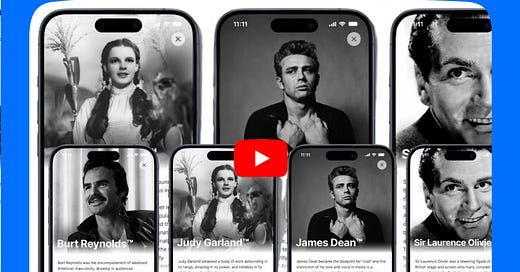A Dead Celebrity Podcast Sends TV Producers into Panic
A beloved host rises from the grave to interview real people as an industry scrambles for guidelines

Manori Ravindran covers international TV from London for Series Business. She recently wrote about producers’ pivot to YouTube for money, how to get a TV buyer to yes (when budget is the problem) and why brands are now funding unscripted shows.
What does legendary British talk show host Michael Parkinson and the Democrats’ presidential election campaign have in common? They were both, in a manner of speaking, raised from the dead in a matter of months. Although, as far as I know, only one has artificial intelligence to thank for it.
Parkinson interviewed everyone from Muhammad Ali to Ali G (some more graciously than others) in an American talk-show style format for BBC and ITV. He died in Aug. 2023 at 88. But early on Monday morning, his plucky voice rang out on Radio 4’s popular Today program to promote a new podcast interview series fronted by . . . an AI “Parky.”
“I’ll be honest with you,” a scarily convincing AI Parkinson implored. “I haven’t the foggiest how any of this technology actually works, but I think this new podcast may just surprise a few people when it’s released.”
He’s not wrong: The eight-part Virtually Parkinson series grabbed national headlines and talk-show slots, and is one of the first big U.K. projects to bring AI’s creative potential for production into the limelight. Its producer, Deep Fusion Films, claims the show is the world’s first unscripted series to be driven by an AI presenter. (Deep Fusion has not yet revealed any interviewees but has said it’s going out to “noteworthy guests.”)
But that attention is tinged with more than a bit of outrage. Criticism, says Deep Fusion cofounder Benjamin Field, is being “leveled at me by all sides at the moment.” The issue: the belief that AI Parkinson is taking the job of a real presenter. “Our podcast explores the relationship between an AI and a human guest,” Field tells me. “It’s not taking somebody’s job because the podcast is inherently about the relationship between an AI and a human. It wouldn’t have been commissioned if it was a regular chat show.”
AI Parky comes on the heels of Love Island broadcaster ITV’s controversial job posting last week for a Head of Generative AI Innovation — a role that, among other things, oversees AI-driven ideas and content creation. The listing was castigated by some of Britain’s top writers, with Derry Girls creator Lisa McGee going so far as to slam the job as “unethical” in an interview with the trade publication Broadcast.
AI is, understandably, a touchy topic. With so many industry workers and freelancers struggling, the optics of a company finding efficiencies via AI are unavoidable and, to many, unsavory. As a result, some corners of the British TV industry have avoided any outward discussion of AI altogether, even if producers are secretly experimenting with the technology. (In the U.S., everyday viewers sleuthed out what they believe to be the use of AI in such projects as the low-budget horror hit Late Night with the Devil and the Netflix true-crime docuseries What Jennifer Did. In the case of Late Night, the creators admitted it; Jennifer’s EP denied it.)
But the more that series like Virtually Parkinson get the greenlight, is it time producers and broadcasters come into the open on AI?
In this issue, you’ll learn:
What Michael Parkinson’s son has to say about this
The reality format that’s accelerating the use of AI
How one big broadcaster is already using AI to speed-up production
Where broadcasters will start using AI in creative — that won’t run afoul of editorial guidelines
How a producer is using custom-built AI to sharpen pitches
Why more producers will embrace AI audio before video
How AI replicas can get living on-camera talent to do more work (and make more money) and already are in sports
Why one producer believes AI needs to be baked into the conceit of programs for audiences to accept it
The legal minefield creators have to navigate, even if they believe they’re taking precautions





